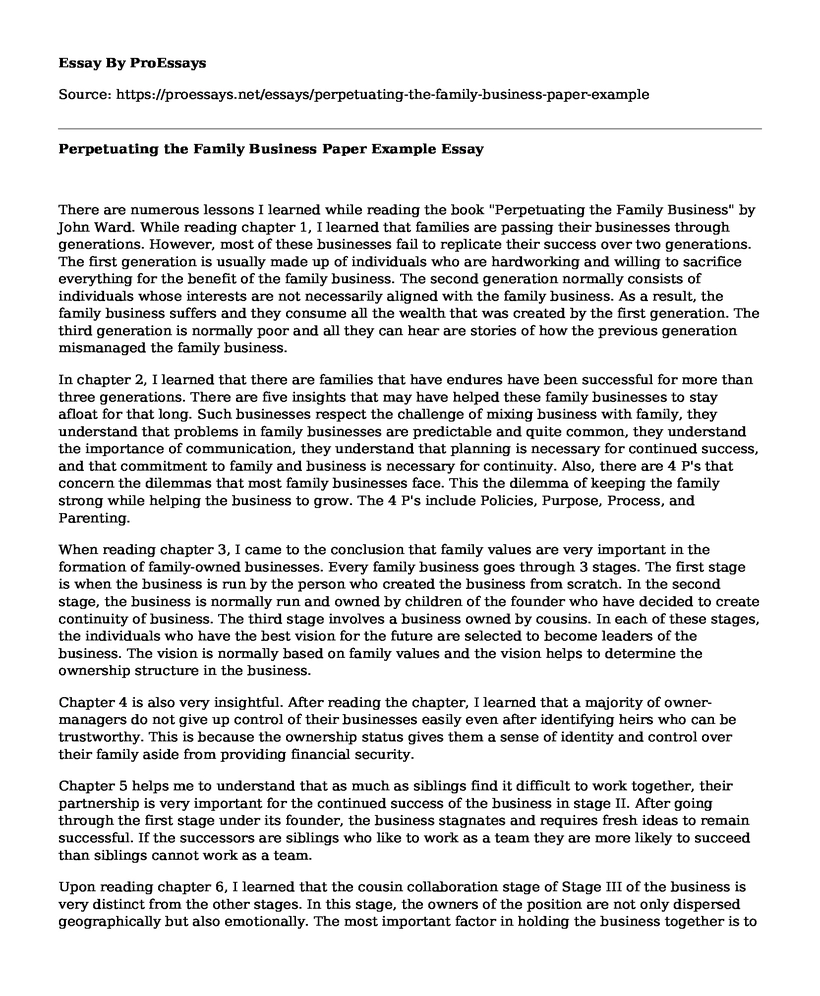There are numerous lessons I learned while reading the book "Perpetuating the Family Business" by John Ward. While reading chapter 1, I learned that families are passing their businesses through generations. However, most of these businesses fail to replicate their success over two generations. The first generation is usually made up of individuals who are hardworking and willing to sacrifice everything for the benefit of the family business. The second generation normally consists of individuals whose interests are not necessarily aligned with the family business. As a result, the family business suffers and they consume all the wealth that was created by the first generation. The third generation is normally poor and all they can hear are stories of how the previous generation mismanaged the family business.
In chapter 2, I learned that there are families that have endures have been successful for more than three generations. There are five insights that may have helped these family businesses to stay afloat for that long. Such businesses respect the challenge of mixing business with family, they understand that problems in family businesses are predictable and quite common, they understand the importance of communication, they understand that planning is necessary for continued success, and that commitment to family and business is necessary for continuity. Also, there are 4 P's that concern the dilemmas that most family businesses face. This the dilemma of keeping the family strong while helping the business to grow. The 4 P's include Policies, Purpose, Process, and Parenting.
When reading chapter 3, I came to the conclusion that family values are very important in the formation of family-owned businesses. Every family business goes through 3 stages. The first stage is when the business is run by the person who created the business from scratch. In the second stage, the business is normally run and owned by children of the founder who have decided to create continuity of business. The third stage involves a business owned by cousins. In each of these stages, the individuals who have the best vision for the future are selected to become leaders of the business. The vision is normally based on family values and the vision helps to determine the ownership structure in the business.
Chapter 4 is also very insightful. After reading the chapter, I learned that a majority of owner-managers do not give up control of their businesses easily even after identifying heirs who can be trustworthy. This is because the ownership status gives them a sense of identity and control over their family aside from providing financial security.
Chapter 5 helps me to understand that as much as siblings find it difficult to work together, their partnership is very important for the continued success of the business in stage II. After going through the first stage under its founder, the business stagnates and requires fresh ideas to remain successful. If the successors are siblings who like to work as a team they are more likely to succeed than siblings cannot work as a team.
Upon reading chapter 6, I learned that the cousin collaboration stage of Stage III of the business is very distinct from the other stages. In this stage, the owners of the position are not only dispersed geographically but also emotionally. The most important factor in holding the business together is to give all family members freedom with regard to their shareholding but at the same time remind them of the family values. Keeping the family close while giving them freedom is what keeps the business running.
Conclusion
Reading this book has given me a new perspective concerning family businesses. I have learned that the continuity of a business across generations depends on the manner in which these businesses are managed. In stage I, the founder is usually hard-working and takes all measures to ensure the business survives or remains successful. In stage II, the survival of the business depends on the teamwork between the siblings. In stage III, the survival of the business depends on the ability of the cousins to remain true to family values despite their freedom regarding ownership. Most family businesses do not survive past this stage. Businesses that have survived over generations are based on strong family values which are deeply rooted in the business.
Cite this page
Perpetuating the Family Business Paper Example. (2022, Jul 25). Retrieved from https://proessays.net/essays/perpetuating-the-family-business-paper-example
If you are the original author of this essay and no longer wish to have it published on the ProEssays website, please click below to request its removal:
- The Central Challenge of Global Strategy Essay
- FoodFun LIS's Business Plan Paper Example
- HCT Group UK (Social Enterprise) Paper Example
- The International Business Environment Paper Example
- Paper Example on Wal-Mart and What It Means for the Foreign Market
- Eating Out: How Restaurants Get You to Spend More - Essay Sample
- Essay Example on Company Expands Internationally Through TV, OTT, and DTC Services







